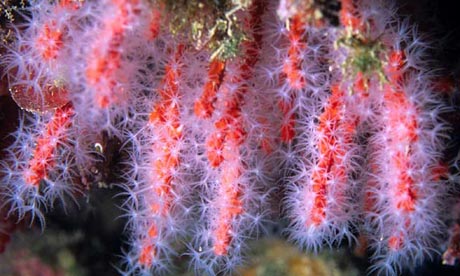DUBAI, March 21 (Reuters) - A U.N. conference rejected on Sunday trade restrictions on red and pink corals used in jewellery in what environmentalists called a new setback for endangered marine species.
Delegates at the 175-nation meeting of the Convention on International Trade in Endangered Species (CITES) in Doha failed to back a U.S. and European Union proposal to limit trade in 31 species of corals, found from the Pacific to the Mediterranean.
"Vanity has once again trumped conservation," said David Allison of Oceana, which calls itself the world's largest international ocean conservation group, of the decision that would have affected trade worth tens of millions of dollars.
"Today is yet another example of CITES failing to protect endangered marine species," he said. On Friday, the March 13-25 conference also rejected a proposal to ban trade in bluefin tuna, prized as sushi in Japan.
Sunday's coral proposal fell short of the needed two-thirds majority by mustering 64 votes in favour with 59 against and 10 abstentions, delegates said.
The proposed restrictions would have stopped short of a trade ban but required countries to ensure better regulations and to ensure that stocks of the slow-growing corals, in the family coralliidae, were sustainably harvested.
CATCHES DROP
Catches have dropped to about 50 tonnes a year in the main coral grounds in the Pacific and the Mediterranean from about 450 tonnes in the mid-1980s, the U.S. and EU proposal said.
In Italy, top quality beads fetch up to $50 per gramme and neckaces sell for up to $25,000, it said. Main harvesting and processing centres include Italy, Japan and Taiwan. The United States is the largest market for red and pink corals.
Some nations objected it was complex to identify the red and pink corals at customs posts. But some rare corals, including black corals, are already protected by CITES.
The wildlife trade monitoring network TRAFFIC and conservation group WWF said they were "deeply disapointed" by Sunday's vote. Measures to protect red and pink corals were also rejected the last time CITES met, in 2007.
"Without the trade control measures this would have introduced, the current overharvesting of these precious corals will continue unabated," said Ernie Cooper of TRAFFIC Canada.
Separately, CITES unanimously approved a proposal by Iran to ban all trade in Kaiser's spotted newt, a type of salamander from Iran, delegates said. The newt is under threat from trade agreed over the Internet by collectors.
